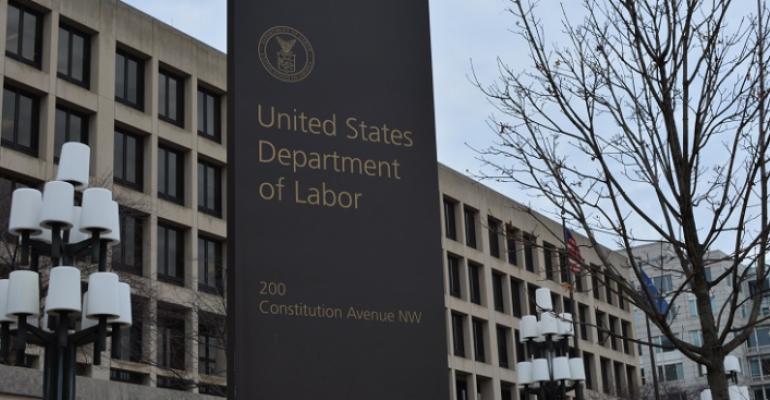A number of trade groups, including the Insured Retirement Institute and the Securities Industry and Financial Markets Association, are urging the the Labor Department’s Employee Benefits Security Administration to extend temporary enforcement guidance that has been in place since the department’s fiduciary exemption rule went into effect in February, in order to prepare for the new rule.
In the letter to Ali S. Khawar, the acting assistant secretary for EBSA, the groups asked the agency to extend the temporary enforcement policy by six to 12 months past its current end date of Dec. 20, 2021.
“EBSA and all stakeholders would benefit from such an extension, as it would allow firms to thoughtfully consider using Prohibited Transaction Exemption 2020-02 and implement it most effectively, while reducing consumer confusion and disruption that would follow from retaining the current date,” the letter read.
The rule, entitled “Improving Investment Advices for Workers and Retirees Exemption,” was intended to align the DOL’s fiduciary conduct rules with the Securities and Exchange Commission's Regulation Best Interest. It allows fiduciaries to partially receive compensation from third parties when recommending certain investments in retirement plans and IRAs, provided they adhere to certain “impartial conduct standards.”
The rule was first proposed during summer 2020, and was finalized in the waning weeks of the Trump administration. When Joe Biden took office in January, it was uncertain whether the rule would go into effect, as it was particularly vulnerable to delay by coming so late in Trump’s tenure. Some consumer advocates urged the Biden administration to delay its effective date.
Nevertheless, on Feb. 12, the Labor Department announced the rule would go into effect as scheduled several days later. But the DOL allowed temporary enforcement guidance enacted after the Obama administration’s fiduciary rule was vacated in federal court in 2018 to continue until Dec. 20 of this year.
The temporary policy states the DOL will not pursue enforcement of the rule if fiduciaries are working "diligently and in good faith" to comply with the impartial conduct standards.
Other signees to the letter to EBSA besides the IRI and SIFMA include the National Association for Insurance and Financial Advisors, the National Association of Independent Life Brokerage Agencies and the U.S. Chamber of Commerce.
In the letter, they argued EBSA should allow the current rules as written should go into effect and have a period of review and evaluation before any further changes are made. In an interview with WealthManagement.com, Jason Berkowitz, the IRI’s chief legal and regulatory affairs officer, said it was “inappropriate” to end the temporary enforcement guidance while simultaneously considering changes to the fiduciary rule (the DOL plans to issue a notice of rulemaking on changing the rule in December, according to the American Society of Pension Professionals and Actuaries).
Based on prior statements and a preamble included in the rule’s final proposal, Berkowitz believed the DOL might try to broaden the definition of who should be included as a fiduciary, and he worried that additional provisions to the exemptions could be “incompatible” with how the industry operates.
“Let’s see if further rulemaking is needed,” he said. “If they’re not willing to hold off on that, they should extend this temporary enforcement policy until they complete that work.”
The letter’s signees argued the potential for changes to the rule is leading firms to not amend their own policies, calling the current rule a “moving target” in which procedures developed today to comply with the rule might not suffice after it’s revised. The IRI and others also worried that smaller firms were less aware of the Dec. 20 expiration of the temporary policy. While larger firms have been preparing for compliance for months, smaller firms might not have the resources to keep pace.
“The resource disadvantages small firms face may prohibit them from being able to comply on Dec. 20, potentially leaving them with no choice but to reject fiduciary status,” the letter read. “This could potentially create an unlevel playing field between retirement investors who utilize large firms versus small firms as their advisors.”
Berkowitz was particularly concerned about the industry’s compliance with a requirement in the exemption demanding that advisors provide a comparison when recommending a rollover from a client’s current account. According to Berkowitz, if a client had a 401(k) and their advisor recommended an IRA rollover, the advisor would need to be able to show the differences between the two options. But Berkowitz argued that 401(k) disclosure statements aren’t always accessible, and even if advisors access that information, firms would need a technology solution to comply.
“Otherwise, you’re going to end up with a lot of back-of-the-napkin, ‘hey, let me sketch this out for you and here’s what it looks like,’ but it won’t be consistent,” he said. “There won’t be as much ability for oversight within the supervisory structure to ensure that information is being presented accurately and appropriately."




